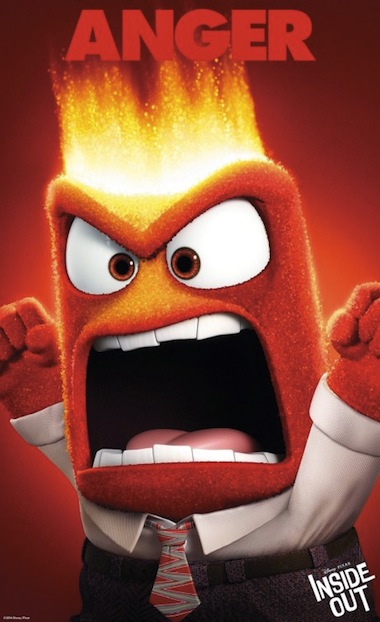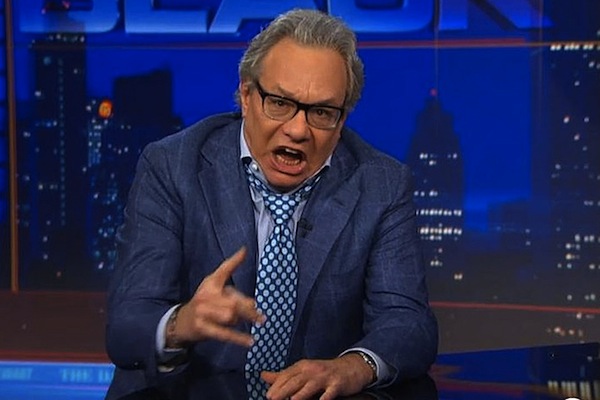
By Jeremy Smith
Lewis Black has been raging full-throttle against life’s myriad idiocies for so long that I’m stunned he hasn’t blown apart like John Cassavetes at the end of THE FURY. He first began working himself into a sputtering-yet-surprisingly-articulate lather as a stand-up comic in the late 1980s, but most people didn’t become acquainted with his paint-stripping vitriol until 1996, when he began appearing on Comedy Central’s THE DAILY SHOW. At first blush, Black’s brilliantly composed invective recalled the high-decibel outrage of Sam Kinison, but was far more inclusive; he connected by getting overly worked up about the types of things we get overly worked up about, but largely keep to ourselves. And this was during the Clinton administration! If you’ve checked in with Black lately, you’re likely to get third-degree burns from the heat of his contempt at the state of the world.
Since Kinison checked out of this circus years ago, Pixar and director Pete Docter had to know there was only one man who could give voice to the emotion of “Anger” in their literally cerebral family film INSIDE OUT – and, fortunately for us, they got their madman. Black’s Anger is a perfect complement to Joy (Amy Poehler), Sadness (Phyllis Smith), Fear (Bill Hader) and Disgust (Mindy Kaling); he’s a perpetually percolating nuclear option bouncing around the noggin of a young girl named Riley. And when life starts piling on, he’s ready to unleash hell – which, in this case, could be anything from a tantrum to, gasp, a profanity (not that Pixar would ever let you hear it in the movie).
When it comes to the origins of Black’s rage, I think I might have a little insight. Before getting into stand-up, Black got an MFA from the Yale School of Drama, which means he knows what it is to do a massive amount of work for very little financial reward. I’ve been there, and given up on that dream. But now that Black is a hugely successful stand-up comedian and voice actor, he actually has the luxury to pursue his stage dreams anew. After decades of struggle, things have worked out quite nicely for Black. But he’s still pissed. He has to be. It pays too well.
When I sat down with Black at the INSIDE OUT press day, I was still absorbing the Cleveland Cavaliers’ loss in Game 1 of the NBA Finals. A little background: that game ended in overtime with the Cavs losing their second-best player, Kyrie Irving, for the rest of the series due to injury. I wasn’t in a good mood. To my delight, neither was Black.

Publicist: You’re rooting for Cleveland?
Lewis Black: Cleveland would’ve beaten them if they had Love and Kyrie. They’d beat them badly. I’m pissed.
Jeremy Smith: I’m mostly resigned. I’m used to it.
Black: I know. You guys have had it rough.
Jeremy: Well, thank you. I appreciate it. (Laughs) So when they first announced this project, I think I was at D23 or one of the conferences they throw every year. But they were announcing who’d they cast as the voices, and when they got to Anger, you were my very first thought. How does it feel to be the first thing some people think of when they think of anger?
Black: I made my bed, and I had to lie in it. The good news is you’re “Anger”; the bad news is you’re “Anger.” It’s great, and the great outweighs the rest of it. If I was going to be a stand-up, and if that’s what the road was going to be, then where I’m funniest is when I’m angry. And people seem to enjoy that. I’ve been lucky.
Jeremy: The angrier you get, the more articulate you get – at least as far as your deployment of profanity goes. But it’s not just about the profanity. It’s a wonderfully inventive use of language all the way around. At what point did you realize that comedy was a viable avenue professionally, as well as something that was creatively fertile for you?
Black: I really wanted to write plays, so I was doing [stand-up] on the side. Then I started running a room in New York City, and what happened when I started running that room was that I would host every show. And then on Saturday nights, because my friends were all broke, we would do a free show at midnight. My friend would play piano and do stuff, and then he’d bring me on and I’d do fifteen minutes. All I did was literally go through the papers each week, and everyday I’d rip stuff out that I wanted to talk about. I would think about it a little bit, but not too much, and then I’d go onstage and yell about it.
Jeremy: Kind of like Mort Sahl in a way?
Black: Yeah, that’s kind of where it was coming from. That’s where it started, and then it blossomed into what it was. Then I became more comfortable on stage, and people were responding more to that. I mean, all of a sudden I was getting acting auditions, and I was getting all of this stuff that I didn’t expect. The next thing I knew, they were coming from comedy clubs, and I had never taken that route.
Jeremy: I was living in New York City when you were exploding on THE DAILY SHOW, and Clinton was still in office. It was refreshing to have someone this angry at a time when, politically, we weren’t that screwed up as a country. Then when things really went in the shitter, it was like your cup runneth over. What was it like to be there for that transition?
Black: Whatever made me angry is what I followed. That was the instinct. Or a story. We went to [the Cannes Film Festival], and there were things in Cannes that made me angry – in retrospect, not at the time because it’s so overwhelming. But there’s a story there, so I’ve started to talk about that. And then there’s a story I’ve been working on about mental health, but then I had to drop it to work on some other stuff. Now it’s back in my act. I’ve started talking about mental illness because it really irritates the shit out of me the way people continue to dismiss it as a problem. Twenty-five percent of the country is still like, “What’s the matter with you? What do you mean you’re depressed?”
Jeremy: There’s this flipside where, for example, Patton Oswalt can go out and do very R-rated material, but then be the voice of Remy in RATATOUILLE. So when kids hear his voice, they run up to him and want to hug him. Now when they hear your voice, I think they’re going to want to do likewise. Are you looking forward to that?
Black: I’m going to wear the suit around, so they can hug me when I’m in the suit. (Laughs) I’m not ready for it. I’m really not ready. I never thought about it. Once I saw the film, I thought, “This will be well received.” Then we saw it in Cannes, and I thought, “Oh, my god, this is going to be big.” Now I’m here, and I’m like, “Oh fuck, it’s going to be huge.” More than I’d imagined. I kept saying to the guys, “Can’t you find a great big musical number like FROZEN? Just one. All we need is one. After Bing-Bong… all I need is an anthem.” But it’s extraordinary to me.
Jeremy: Philosophically, from what I’ve heard in your act, and the fact that this takes place in their mind, the idea of someone dealing with their own brain chemistry and struggling to adjust… the fact that there’s no magic thing that solves it. It’s not an act of god or anything. I think it’s really cool that there’s a kid’s film that presents emotions in this way, and I like how it jibes with your act. Was that something that was appealing to you?
Black: We didn’t realize what the message was going to be when we saw it. (Laughs) I thought we were going to have a really funny ending! Because I just wanted to beat FROZEN. That’s all I cared about. That was my initial instinct. But Bill said it, and I’ve said it, too: I wish I would’ve seen this movie when I was a kid. It would’ve helped. It would’ve been a huge help.
Jeremy: Pixar has the license to take chances like that. And while I can already hear the usual suspects taking shots at it, the fact that it’s funny and entertaining and intellectually nourishing is really wonderful.
Black: That’s always been my impetus. I taught creative dramatics when I was in theater, and I taught kids acting. I wrote for kids, and I did a bunch of stuff with kids. People often ask, “Don’t you want to have a kid?” And I say, “I’ve worked in the American Theater. I already feel like I’ve raised 12 million kids.” For me, this is just a logical extension, and if I was going to work with a group that’s an extension of my feelings about what the world should be and what we should strive for, it’s Pixar. What Pixar does as a unit is what our leadership should be doing. When I’m on the road, I feel like audiences can handle anything. Just talk to them, you morons!
Jeremy: I hate to end on a depressing note, but the American Theater… (Black laughs) I have a theater degree, I wanted to work in theater and be a playwright, but then I had to make money. Now that you’re at this place in your career, is there a way to come back to theater as a career?
Black: There is. I have a play that was published finally. I wrote it forty years ago, and it got published, and was done in some very nice theaters. It’s now making the rounds in community theaters, and I’ve started another play. One of the things I think about doing… I mean, I can’t keep doing stand-up. This is insane. So eventually I’ll quit stand-up, and I’ll sit down and start writing again. And I can afford it.
You can ill-afford to miss INSIDE OUT, which is now in theaters. Get out and see one of the best movies of the year.
